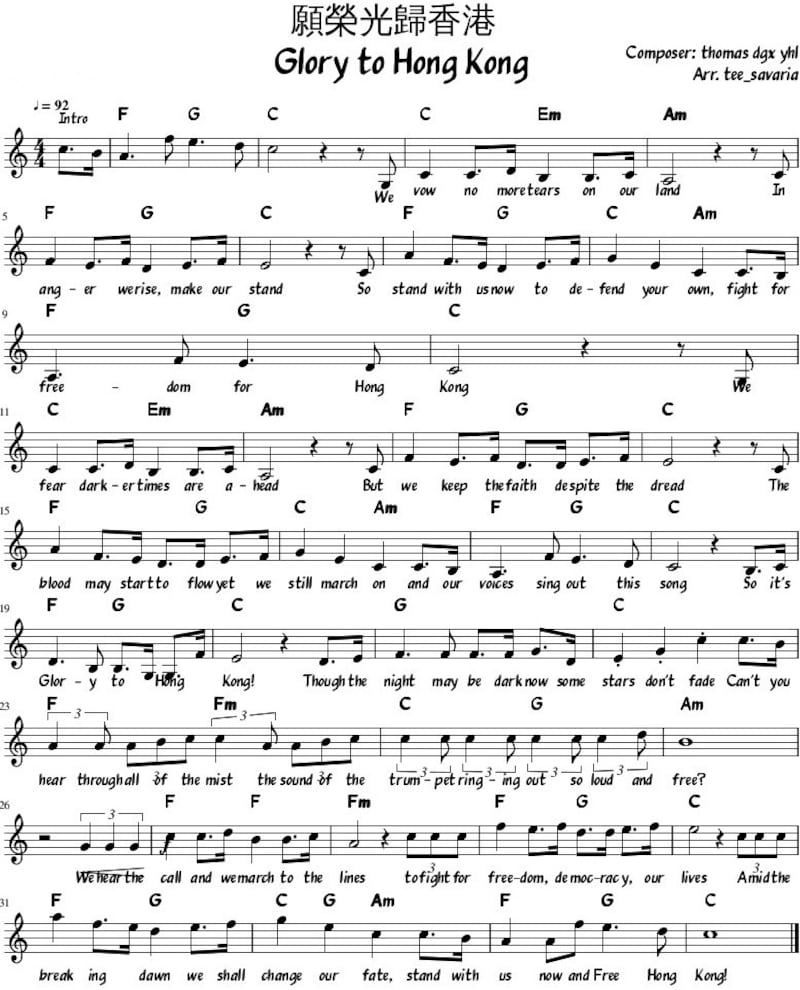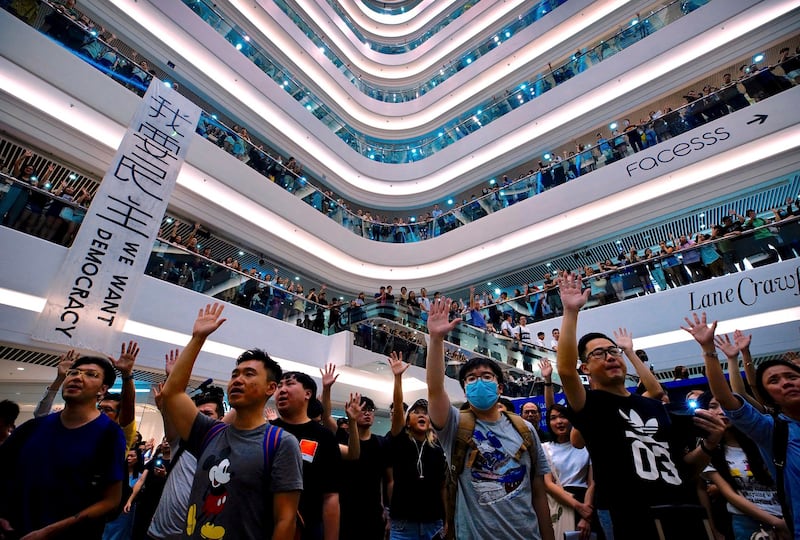Hong Kong authorities sought a court injunction prohibiting the dissemination and performance of the banned protest anthem, “Glory to Hong Kong,” prompting downloads of the song to surge.
The anthem was regularly sung by crowds of unarmed protesters during the 2019 protest movement, which that ranged from peaceful demonstrations for full democracy to intermittent, pitched battles between "front-line" protesters and armed riot police.
It was banned in 2020 as Beijing imposed a draconian national security law on the city.
The song calls for freedom and democracy rather than independence, but was nonetheless deemed in breach of the law due to its "separatist" intent, officials and police officers said at the start of an ongoing citywide crackdown on public dissent and peaceful political activism.
"It is very unreasonable to ban the broadcast of 'Glory to Hong Kong'," said a Hong Kong resident who gave only the nickname May for fear of reprisals. She said had downloaded the song in the past 24 hours. "As a citizen, I feel very uneasy about this."
"I want to listen to it more, now -- I want to hear it again before it is taken off the shelves, or there is no way to listen to it any more -- to commemorate the social events of that time," May said.
Played at sports events
The lyrics of the song contain speech ruled by the court as constituting "secession," a government statement said, referring to recent broadcasts of the song in error at overseas sports events featuring Hong Kong athletes.
"This has not only insulted the national anthem but also caused serious damage to the country and the Hong Kong Special Administrative Region," it said.

"The Department of Justice of the Government of the Hong Kong Special Administrative Region (HKSAR) applied to the Court ... to prohibit four items of unlawful acts relating to the song "Glory to Hong Kong,’" the statement said.
In November, Hong Kong police announced a criminal investigation into the playing of "Glory to Hong Kong" at a rugby match in South Korea.
If the court injunction is granted, it will outlaw the broadcasting, performing, publishing or other dissemination of the song on any platform, especially with "seditious" or "pro-independence" intent, the government said.
It will also become harder to track down the song online, as global platforms could seek to conform with the ruling simply by taking it down.
The news prompted a spike in digital downloads of the song from iTunes, with different versions of the song featuring in nine of the top 10 download spots for the Hong Kong market.
Meanwhile, keyword searches for "Glory to Hong Kong" in Chinese surged following the government statement, remaining at a new high on the Google Trends tracking app at 7.00 a.m. local time on Wednesday.
‘Attack on freedom of speech’
Former pro-democracy District Council member Carmen Lau, now in exile in the United Kingdom, said the move is part of an ongoing crackdown on public expression in Hong Kong since the national security law took effect that has seen hundreds of titles removed from public libraries and bookshops, as well as bans on the screening of some movies in the city.
"As far as I know, this is the first time that the government has used a court procedure to apply specifically to the release or broadcast of this song in Hong Kong," Lau said. "This is a precedent, and is a serious attack on the freedom of speech, and on artistic freedom."
"Now this precedent has been set, many other freedoms of the press, and cultural freedoms, will be suppressed too," she said.

Benson Wong, former assistant politics professor at Hong Kong Baptist University who is now in Britain, said the ban, if issued, will send a strong message to the international community.
"If the court really does issue an injunction banning the playing of 'Glory to Hong Kong,' this will be the first song ban in Hong Kong," he said.
"It will also become clear that there is nothing left of the rule of law or judicial independence in Hong Kong," Wong said.
He said the move was likely prompted by massive official embarrassment over the playing of the wrong anthem at recent sporting events, adding that Hong Kongers would likely have to turn to circumvention software to access the song in future.
The spirit of Hong Kong
U.K.-based former pro-democracy councilor Daniel Kwok said the song remains hugely popular among Hong Kongers.
"Everyone likes this song very much, protesters and the international community alike," Kwok said. "Hearing this song is like hearing the spirit of Hong Kong."
"It represents Hong Kongers as an ethnic group far better than [the Chinese national anthem]," he said. "This is a song that belongs to and represents the people of Hong Kong."
Executive Council member Ronny Tong said anyone found downloading the tune could face up to seven years' imprisonment for "contempt of court," if the injunction is granted.
He called on residents of Hong Kong to delete the tune if they have downloaded it already, just to be on the safe side.
Lau said she still expects to hear the song at overseas protests by Hong Kongers, however.
Current affairs commentator Sang Pu said the Hong Kong authorities are unlikely to be able to enforce the ban outside the city.
"Injunctions granted by a Hong Kong court are only applicable to Hong Kong," Sang said. "Many overseas versions have been posted overseas, to accounts on YouTube and Instagram, so how will they implement it there?"
Translated by Luisetta Mudie. Edited by Malcolm Foster.
